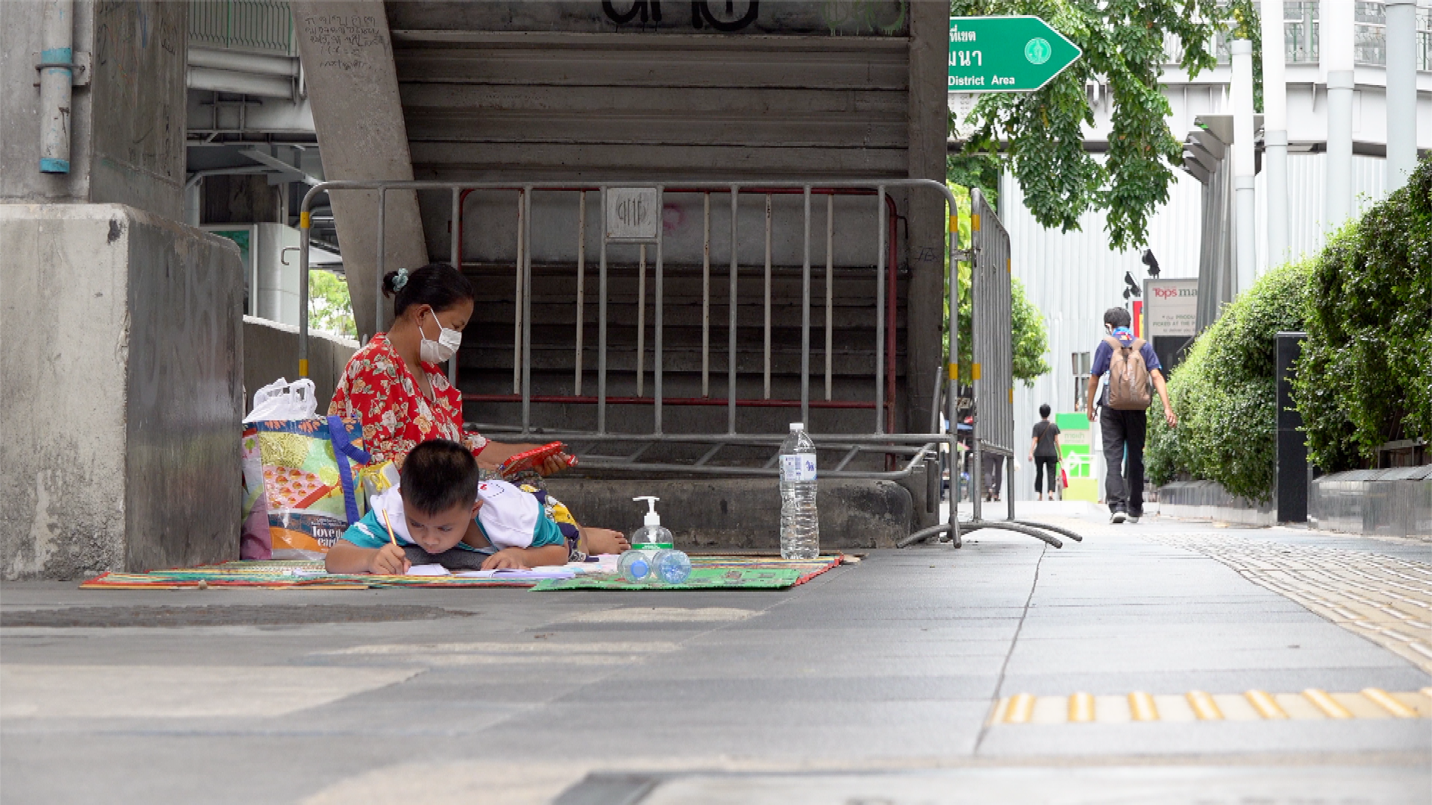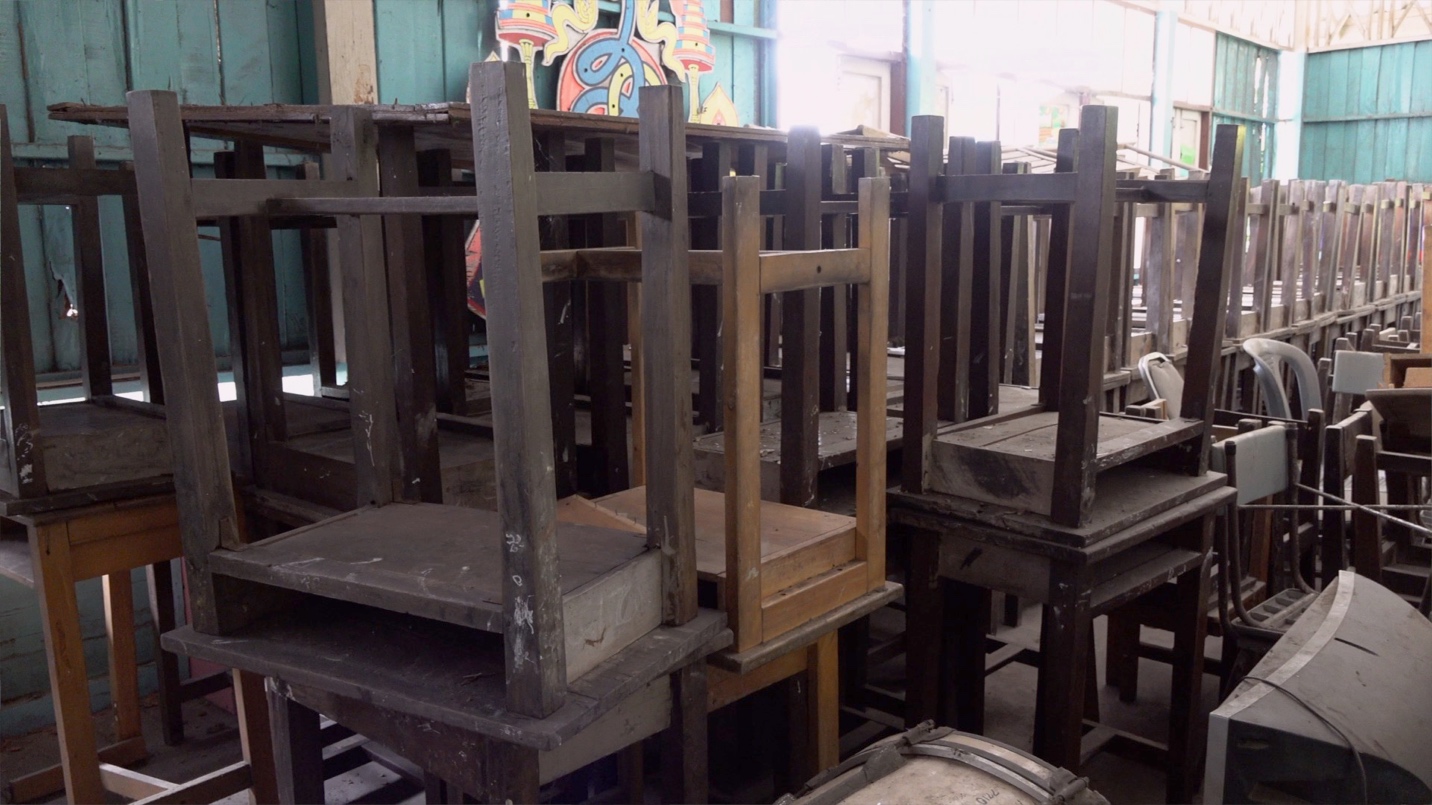
Education has become unaffordable for many families in Bangkok, Thailand, given the impact of the virus, as new groups are suddenly living in poverty. /CGTN
Education has become unaffordable for many families in Bangkok, Thailand, given the impact of the virus, as new groups are suddenly living in poverty. /CGTN
Ten-year-old Phumeakkawut is like many other kids his age. Full of energy, laughing with smiles of innocence. It's smiles that mask the harsh reality of the world he is living in, perhaps oblivious to how his life has taken a terrible turn.
One year was all it took – from having a home, to living on the streets. Before COVID-19, his mother was earning a decent wage as a masseuse but restrictions on social distancing meant no more work. She would wake up and take her son to school every morning, but now, she doesn't know if she will ever do a school run again.
While kids around Bangkok are in virtual classrooms, Phumeakkawut is sitting at a major intersection with crinkled worksheets and surrounded by blackened exhaust fumes. This is what's left of his schooling days and it's reaching a point of no return.
"I got hit really hard by the pandemic. I'm so lost, even a roof to cover our heads, I still can't afford," Waraporn Chanchiaw, Phumeakkawut's mother, said. "It's not only school fees, it's also the cost of uniform, books, transportation… everything. It breaks my heart to see my son like this because of my financial difficulties"

Schools in Bangkok have remained closed for almost four months as the country battles its third wave of COVID-19. About 90 percent of Thailand's more than 271,000 reported coronavirus cases and 95 percent of the deaths have been recorded during a surge that began in early April, 2021. /CGTN
Schools in Bangkok have remained closed for almost four months as the country battles its third wave of COVID-19. About 90 percent of Thailand's more than 271,000 reported coronavirus cases and 95 percent of the deaths have been recorded during a surge that began in early April, 2021. /CGTN
Her story echoes across the country. It is commonly told in tourism-dependent towns where unemployment has soared. Thai Hotels Association estimates that 80 percent of tourism businesses in these towns have remained closed. For this workforce, their world has turned upside down and schools have fallen down their priority list.
Numbers are hard to come by but the early signs aren't encouraging. Schools in Bangkok have remained closed for almost four months as Thailand battles its third and worst wave of COVID-19. And organizations say, the signs are there that a massive dropout crisis has well and truly begun.
"This year Thailand is facing a severe education crisis. As a result of pandemic, poverty and inequality has reached new heights," said Professor Sompong Jitradub, the director of Civil Society at The Equitable Education Fund (EEF). "Without assistance or government support, the dropout rate could hike 10 to 15 percent."
In Thailand, education at public schools is free of charge until Grade 9. However, Professor Sompong said that there are other costs in education such as travel and food expenses which are about 2,000-6,000 Thailand Baht (about $60 - $185) a month, making it impossible for some students to continue their studies.
The Equitable Education Fund estimates that preventing students from dropping out of the education system will increase Thailand's GDP by three percent.
Aside from the economic benefits of an educated youth, there are other reasons for keeping children in school. Tongpul Bousri is the head of Street Teacher Project of the Better Life of Children foundation. For more than three decades, it is her mission for life to keep vulnerable children in the education system. Her caseload this year has more than doubled. Through donations, she has been on a desperate mission to get kids back into school because the alternative could be a life of desperation.
"Once kids are dropped out of school, they hardly return," Tongpul Bousri said. "They are likely to be exposed to risks like human trafficking, prostitution and get pushed into exploitative child labor."
It's a reality that mom, Waraporn, is afraid for her son, Phumeakkawut. Because her son has become part of a growing "lost generation," a generation left out of a system that was meant to be their ticket to a brighter future.

